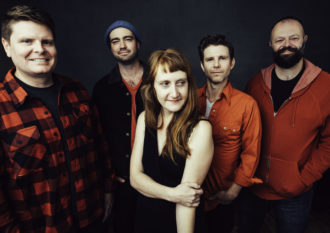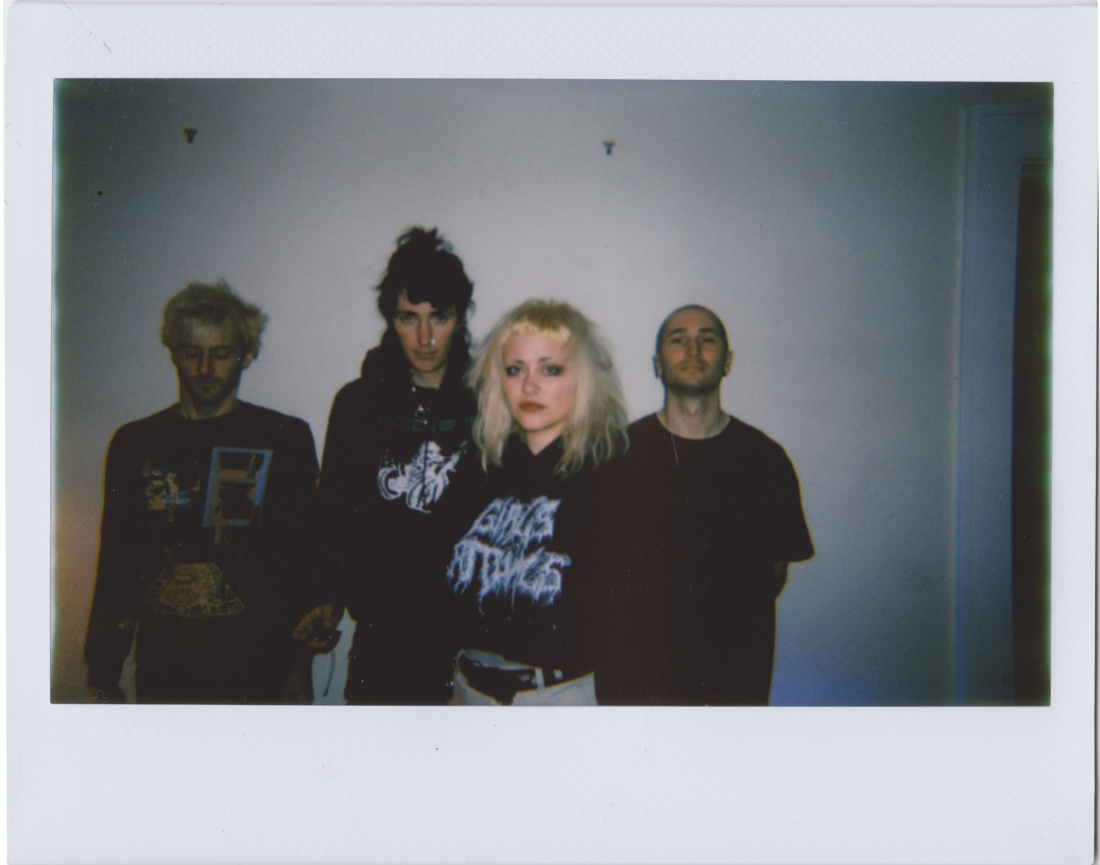Karly Hartzman had no idea that the tweet would prove controversial.
On March 22, the vocalist for Asheville-based indie rockers Wednesday posted an itemized list of the band’s expenses and earnings from its SXSW Music Festival tour. Though she noted that the Austin, Texas-based festival is “a special circumstance” and that she and her four bandmates had a great time, the experience wound up costing them $98.39. That total, she pointed out, didn’t include food expenses or the 10% cut for their booking agent — plus they all contracted COVID-19.
Hartzman’s stated intention in posting this information was for the sake of transparency and to show why it’s so difficult for bands to play SXSW, particularly during inflation. Citing the “devastating” combination of gas prices and staying in presumably COVID-safe places, she elaborated that “touring the cheapest way isn’t always touring the ‘right’ way if it makes it unsustainable for you physically/mentally.”
Breaking down the numbers, Hartzman revealed that she and her band shared an Airbnb for five days with another band, with Wednesday’s split totaling $1,210. And though Wednesday played seven shows in Austin, the band only got paid for one — a house show that also proved to be the only place where they sold any merchandise. Due to the packed, speedy nature of SXSW showcases, Hartzman noted that opportunities to sell albums, T-shirts and the like were few.
“A reminder that music is simply an industry that is very inaccessible to people without a safety net of time/money,” she tweeted. “If there was anyway we could make it easier for people to live off of music, imagine how much more music we’d be able to listen to.”
While the tweet thread received a fair amount of positive responses from fans and fellow touring artists, it also attracted a slew of unsolicited advice. Some commenters suggested that the lost revenue was the result of poor planning on the band’s part; others offered Hartzman financial advice; and, among several purported quick fixes, one commenter wondered why Wednesday didn’t sleep in its van.

“I’ve done the kind of DIY touring people were suggesting in the quotes, and it made me want to never tour again,” Hartzman replied. “I love playing music, so I’m gonna do it in a way that helps me feel like I can do it for the rest of my life.”
Before ending her part of the thread, Hartzman added, “I hope it’s easier for more people to be touring musicians if they want to in the future! But it’ll take a rethinking of how we engage with music through streaming or whatever.”
Such are the realities facing local touring musicians in a time when consumer prices have risen by 9.1% over the past year and gas prices remain above $4 per gallon. Along with effects stemming from the ongoing COVID-19 pandemic, it’s an especially difficult time to financially justify being a full-time performing artist. Yet with significant amounts of ingenuity and determination, Asheville-based talents are finding ways to make it work.
The mighty dollar
“A few months ago, we were averaging under $80 a day in gas,” says Matthew (who goes by his first name only), bassist for Asheville-based post-punk group Secret Shame. “Now it’s around $120.”
In turn, 60%-70% of the band’s budget on its 13-day spring Midwest tour went toward fuel, leaving hotel rooms and Airbnbs as luxuries. The band did its best to stay with friends whenever possible, but in places where they didn’t have lodging lined up, they asked into the mic if someone in the crowd could house them for the night.
“Sometimes there’s a bed, but usually it’s floor and couches. Often this meant our sleep wasn’t as good,” Matthew says. “I guess the creative workaround of staying with strangers can be good. You meet people and get to know them better than you would just talking at a show.”
For other bands, living-room camping is a thing of the past. When local Americana ensemble Amanda Anne Platt & The Honeycutters were starting out in the late 2000s, they would gladly accept whatever lodging they could get. But at age 36, Platt is the youngest person in the band, and with her husband (and Honeycutters drummer), Evan Martin, and their 2 1/2-year-old daughter in tow, such accommodations are no longer practical. Add in local singer/songwriter Hannah Kaminer, who doubled as opener and nanny on The Honeycutters’ late spring East Coast and Midwest tour, and that’s one more member to consider.
“Now, everyone wants a bed,” Platt says.
With three of The Honeycutters and Kaminer in Platt’s minivan and the family of three in Platt’s self-described “clown car” (i.e., a Toyota Yaris), the band spent less on fuel than it would have with rental vans, avoiding a daily loan charge in the process. Nevertheless, increases in hotel costs, paying for Kaminer’s child care services and higher gas prices resulted in less full-ensemble meals on the band’s tab and fewer fun group activities than on previous tours.
While such pricey considerations are common for bands, Mike Savino, the Asheville-based banjoist/vocalist who performs as Tall Tall Trees, has created a flexible act and is somewhat inflation-proof as a result. On his own, using loops and pedals to emulate different instruments, he’s a one-man band. But he’s just as adept performing with a full band — if the funds are available.
“I can go solo if I want. I can fly to a show with three items and make a show of it. I’ve got a very low overhead. If I want to bring a drummer or even more people and there’s a budget for that, I can,” he says. “I’ve always just been DIY — it’s the reason I play the instrument that I do, something that can play all the instruments’ jobs.”

But even with keeping his expenses low, Savino has been asking venues for more money per show to keep pace with inflation — a request that is generally honored. Matthew has similarly seen the $5 punk show — a standard rate since the ’80s — frequently increase to $10 and go even higher if Secret Shame is supporting a well-known band.
“It’s great [getting paid more] because literally everything else costs more, but it can also exclude people, given that minimum wages haven’t increased in over a decade,” Matthew says. “We also raised the prices of shirts, CDs and records — partially to keep up with the cost of those being raised for us and partially because we see other bands raising their prices.”
Though Savino calls merch “the bread and butter” of touring, supply-chain issues kept him from getting vinyl copies of his records prior to the 15,000-person Winnipeg Folk Festival in early July, which he says cost him “a lot” of potential revenue.
Yet even for bands that have all of their proverbial ducks in a row prior to heading out on the road, COVID has disrupted or destroyed touring plans for many artists, leaving them well short of their financial goals.
“Unfortunately, the economics of touring, you don’t start to hit a profit until you get halfway, especially if you’re touring in a tour bus. If you can get to halfway and break even, then you start to get to the second half and you start to make your money back and actually get paid,” Savino says. “But if you’re canceling your tour halfway and you haven’t even made your expenses yet, then you’re losing money and that’s no bueno — and, really, it’s not sustainable.”
Business and pleasure
On the other side of the industry, area venue owners are fighting their own battles with inflation. At Fleetwood’s in West Asheville, owner/talent buyer Mary Kelley has witnessed high gas prices make travel cost-prohibitive for bands, especially artists who get around in touring vans.
“We are seeing less requests for shows from artists that aren’t regional,” she says. “We’ve also had a dip in tourists visiting and coming to check out live music.”
Bob Hinkle, owner of White Horse Black Mountain, has likewise encountered artists nixing summer 2022 touring due to rising costs as well as some who’ve taken the plunge but are encountering unexpected financial struggles out on the road. He says he’d be surprised if many musicians are able to take home 20% of their tour earnings. But as a former touring musician — “back before electricity,” he jokes — and manager of artists struggling to break even, Hinkle has a good deal of sympathy for today’s performers. He adds that being “somebody whose cheese hasn’t quite fallen off the cracker but is hanging by a very thin margin” has also helped him and like-minded peers weather bumps in the road.
“Many times in my 50-plus years of being in this wonderful business of music, I’ve opined how crazy we all are to be in it,” he says. “I still think that merits consideration, but I remain unabashedly in love with it. The vast majority of the people I meet are individually wonderful. My life’s head is full of music, and it sustains me.”
For love of the game
Hinkle’s “wouldn’t want to do anything else” mentality overlaps with the reasons that many area artists continue to hit the road and play for people.

Platt notes that The Honeycutters started touring because they felt that they couldn’t play often enough in Asheville to make a living and still sustain interest from local fans. But apart from the business side, she generally enjoys getting to travel, meet new people and see new places.
“I do think it’s a viable way to make a living, and now that CD sales are in decline, ticket and merch sales from shows are more important to an artist’s income,” she says. “It’s not the easiest way to make a living, though, and for many people — myself included — not the most lucrative endeavor. So I would say that the biggest reason that I keep touring is that I love being on the road and playing music. For all the ups and downs, I think that’s the bottom line.”
Though Secret Shame is not yet to the point where its members are making a living from music, Matthew says attaining that goal and a love of performing for others is what keeps them hitting the road. The group recently landed an agent and plans to continue touring, since — despite rising costs — “that’s the only way to make money as a band these days,” Matthew says.
Wednesday, however, has seemingly turned that corner. In late May, Hartzman posted a screenshot of the ensemble’s most recent tour data from its nationwide two-month run opening for Chicago-based rockers Beach Bunny and a headlining West Coast leg. Thanks to encouraging merch sales, crashing at people’s houses 75% of the time and being paid $500 a show ($750 at The Orange Peel), the band made just over $5,700 — which she said was only the second time it’s made a profit in five years of touring. For shows in much of the tour’s second half, the group also raised money for abortion funds in the state they played in each night, which totaled $2,355.
Though she’s not sure if she’ll continue sharing financial records, Hartzman also noted that “every dollar was gas money for almost every tour before this” — reiterating that the current touring model has been broken for a long time.
“Wish I had started doing this earlier to illustrate how rough touring is before you get to this point,” she said via Twitter. “Highly encourage bands that are doing DIY touring to post their expenses, cause it’s f***ing insane.”




Before you comment
The comments section is here to provide a platform for civil dialogue on the issues we face together as a local community. Xpress is committed to offering this platform for all voices, but when the tone of the discussion gets nasty or strays off topic, we believe many people choose not to participate. Xpress editors are determined to moderate comments to ensure a constructive interchange is maintained. All comments judged not to be in keeping with the spirit of civil discourse will be removed and repeat violators will be banned. See here for our terms of service. Thank you for being part of this effort to promote respectful discussion.